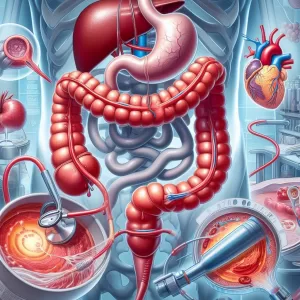ما هو ألم الزائدة الدودية؟
There are a number of reasons you might experience bleeding after sex. If you have an intrauterine device (IUD), you might wonder if bleeding after sex is a normal side…
An IUD is placed high in the uterus, so chances are that a partner would not feel it during sex. Even if they do, it isn’t likely to be painful…
Post-IUD Insertion: How Long Should You Wait Before Having Sex? You may have heard that you need to wait anything from 1 to 2 weeks or more to have sex…
Some supplements, including magnesium and probiotics, may help relieve constipation. But they can also cause side effects. Constipation affects up to 20% of adults worldwide and can significantly affect quality…
Constipation is the difficulty of emptying your bowels. Fecal impaction is the buildup of hardened stool in your bowel that you can’t pass. Fecal impaction is a potential complication of…
A gastrointestinal fistula (GIF) is an abnormal opening in your digestive tract that causes gastric fluids to seep through the lining of your stomach or intestines. If you have a…
An aortoenteric fistula is a rare but life threatening complication of aortic surgery requiring immediate surgical repair. Early symptoms include abdominal pain or vomiting blood. A fistula is an abnormal…
Thrombectomy and thrombolysis are two medical procedures doctors use to treat blood clots. The one you need will depend on your circumstances. Aleksandr Zyablitskiy/Getty Images The primary difference between the…
Vena cava filters may prevent blood clots in your veins from reaching your lungs. They may be permanent, long-term solutions or temporary screens that may be removed after a few…
Superior mesenteric artery syndrome is a rare type of compression of the small intestine. It’s a treatable condition, but a delayed diagnosis can lead to more severe symptoms or even…
**Question: What is Appendix Pain?**
**Answer:**
Appendix pain refers to discomfort in the right lower quadrant of the abdomen, which is where the appendix, a small finger-shaped organ protruding from the large intestine, is located. It’s a common symptom of appendicitis, an inflammation of the appendix that can lead to serious complications if left untreated.
**Symptoms of Appendix Pain:**
* Sharp, stabbing pain in the lower right abdomen, initially around the belly button
* Gradual migration of pain to the lower right quadrant
* Nausea and vomiting
* Loss of appetite
* Low-grade fever
* Diarrhea or constipation
**Causes of Appendix Pain:**
Appendicitis occurs when the appendix becomes obstructed, usually by stool, a foreign body, or a tumor. This obstruction leads to inflammation, which can cause the appendix to rupture if not treated promptly.
**Differential Diagnosis:**
Other conditions with similar symptoms to appendix pain include:
* Gastroenteritis (stomach infection)
* Urinary tract infection (UTI)
* Ovarian cysts (in women)
* Hernia
**Diagnosis:**
Diagnosis of appendicitis involves a physical exam, medical history review, blood tests, and imaging studies such as ultrasound or computed tomography (CT) scan.
**Treatment:**
The standard treatment for appendicitis is surgical removal of the appendix (appendectomy), which is a relatively straightforward procedure. Antibiotics may also be administered to treat any infection.
**Complications of Untreated Appendix Pain:**
Ignoring appendix pain can lead to serious complications, including:
* Rupture of the appendix, causing peritonitis (infection of the abdominal cavity)
* Sepsis (overwhelming infection)
* Abscess formation
* Death
**When to Seek Medical Attention:**
If you experience sudden onset of severe lower right abdominal pain accompanied by other symptoms of appendicitis, seek immediate medical attention. Early diagnosis and treatment are crucial to prevent complications.
تعليق واحد
اترك ردّاً
المقالات الشعبية








Appendix pain is a common problem, especially in young adults. It can be caused by a variety of factors, including infection, inflammation, or blockage. Symptoms of appendix pain can include:
* Sudden, sharp pain in the lower right abdomen
* Nausea and vomiting
* Fever
* Chills
* Constipation or diarrhea
If you are experiencing any of these symptoms, it is important to see a doctor right away. Appendix pain can be a sign of a serious medical condition, and early treatment is essential.
### What are the risk factors for appendix pain?
There are a number of risk factors for appendix pain, including:
* Being young (between the ages of 10 and 30)
* Being male
* Having a family history of appendix pain
* Having a history of abdominal surgery
* Having a weakened immune system
### How is appendix pain diagnosed?
Appendix pain is diagnosed based on a physical examination and a medical history. Your doctor will ask about your symptoms, including when they started, how severe they are, and where they are located. Your doctor will also perform a physical examination, which may include pressing on your abdomen to feel for pain or swelling.
In some cases, your doctor may order additional tests to confirm the diagnosis of appendix pain. These tests may include:
* Blood tests
* Urine tests
* Imaging tests, such as an ultrasound or a CT scan
### How is appendix pain treated?
Appendix pain is typically treated with surgery to remove the appendix. This is a relatively simple procedure that is usually performed laparoscopically, which means that it is done through small incisions in the abdomen.
In some cases, your doctor may recommend antibiotics instead of surgery. Antibiotics can be used to treat an infection of the appendix, but they are not always effective.
### What is the prognosis for appendix pain?
The prognosis for appendix pain is generally good. If the appendix is removed promptly, the condition can be cured. However, if the appendix ruptures, it can lead to a serious infection, which can be life-threatening.
### How can I prevent appendix pain?
There is no sure way to prevent appendix pain, but there are some things you can do to reduce your risk of developing the condition. These include:
* Eating a healthy diet
* Exercising regularly
* Maintaining a healthy weight
* Getting enough sleep
* Avoiding smoking
* Limiting alcohol intake
If you have any of the risk factors for appendix pain, it is important to be aware of the symptoms and to see a doctor right away if you experience any of them. Early diagnosis and treatment can help to prevent serious complications.